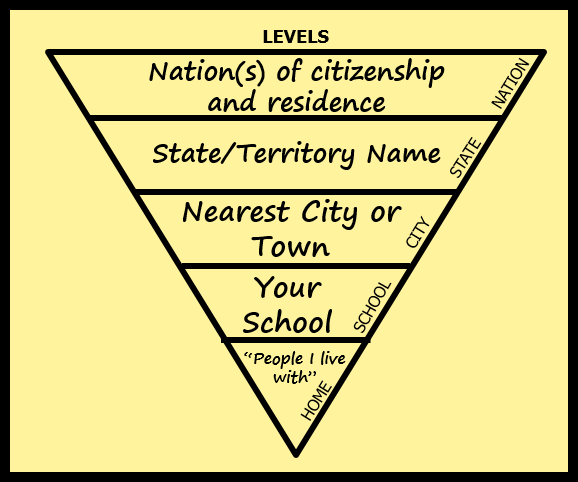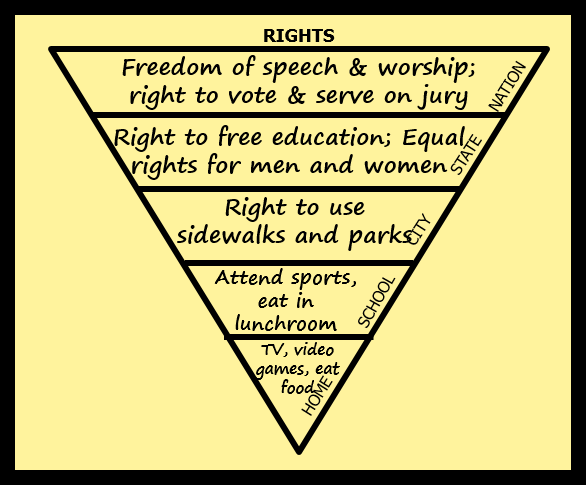CITIZENS RIGHTS AND RESPONSIBILITIES
Unit Overview
In this unit, you are going to learn that the purpose for goverment in the United States is to establish order, protect the rights of individuals and promote the common good.
Levels of Citizenship
Do citizens have any rights? Do they have responsibilities? If so, where do these rights and responsibilities come from?
You may not think of yourself as a citizen, but you are one. A citizen is a member of a community who has rights and responsibilities. A community is a group of people who share an environment. The word “citizen” can have two meanings:
- People who live in a certain place or are a member of a certain community.
- People who are legally recognized by a nation as owing loyalty to that nation and being entitled to protection by the nation.
The people you live with at home make up the smallest “community” you belong to. Your school or workplace is a community, too. These are the people you interact with outside your home every day. You are also a citizen of the city or county where you live. Our nation is made up of 50 states, a district, and five territories. You are a citizen of the state or territory where you live, too! Finally, you are a citizen of your country. To be a citizen of a country, you must be legally recognized by that country. Usually that happens when you were born there or you went through a process to become a citizen. Even so, non-citizens living in a country are still “citizens” in the sense that they are members of the community. Can you think of any other levels of citizenship that you have?

Citizens have rights and responsibilities, but where do those rights and responsibilities come from? That depends on the level of citizenship.
In the United States, at the national level we are guaranteed a list of rights in our Constitution. The Constitution was written when our nation was born, and it sets the rules for how our nation will run. Laws passed by the U.S. Congress can also create rights.
Each state also has its own constitution and its own set of laws. State constitutions and state laws contain the rights and responsibilities of state citizens. Cities often have a city charter that tells how the city will run. Cities also pass laws, which are usually called ordinances.
Most schools have a school handbook that lists the students’ rights and responsibilities. (Workplaces usually have an employee handbook.) At home, the adults in charge decide what your rights and responsibilities will be. Maybe you even have a written list of your responsibilities and what you are allowed to do!
Can you think of any other sources of rights and responsibilities?
Citizens' Rights
A right is a privilege or a claim to something. At the national level, the U.S. Constitution guarantees really big rights such as freedom of expression, freedom to peacefully assemble, freedom to petition the government, freedom of worship, and the right not to have the government search your stuff without a warrant. In fact, these rights are guaranteed to everyone living in the U.S. — not just U.S. citizens! Rights that belong only to U.S. citizens include voting in a federal election, serving on a jury, and running for federal political office. State constitutions repeat many of the guarantees in the U.S. Constitution, but they often add more. Your state constitution might guarantee the right to a free education or equal rights for men and women. A city charter gives you the right to services your city provides, such as sidewalks or parks. Would it be a problem if the U.S. Constitution talked about sidewalks? What rights do you have at your school? At your home?

Citizens' Responsibilities
Responsibilities are duties to other people, the government, or society. At home, you are responsible for doing what the adults in charge ask you to do. You might have to sweep the floor, wash the dishes, or even wash the dog! At school, you are responsible for following the rules. You are probably not supposed to throw paper airplanes, chew bubble gum, wear your hat backwards, or carry weapons.
City charters and city ordinances list the rules that apply in the city. For example, an ordinance may say, “There is a $50 fine for flying a kite in the park.” That means you have a responsibility not to fly your kite there. Paying taxes is a big responsibility you will find at all levels, including the state level. Your state might have taxes on property you own, income you earn, and even stuff you buy at the store.
The U.S. Constitution does not have a list of responsibilities, but it does create a government that cannot work if people do not participate. Voting in federal elections and serving on a jury are two responsibilities just for U.S. citizens, and they require participation. Some citizen responsibilities are voluntary--like voting and volunteering, while others are mandatory--like paying taxes, obeying laws, serving as a witness, and registering for the draft. What if nobody showed up to vote? Or what if they voted without understanding the issues? How could you have a jury trial if everyone refused to do jury duty? These are responsibilities U.S. citizens have to both society and the government. The Constitution also gives Congress the power to make laws, and all U.S. residents have a responsibility to follow the law. What other responsibilities do you have? At which level?
The Responsible Citizen
A responsible citizen promotes the common good by obeying the law, paying taxes honestly, informing himself about important political issues, volunteering in the community and respecting the rights and opinions of others. A responsible citizen is willing to sacrifice his individual interests for the collective good of the nation. He remembers his civic duties and serves his country despite any discomfort such a course might bring.
Print and complete the following activities!
Rights and Responsibilities Activity
Ted's Big Day of Rights and Responsibilities
Citizen's Responsibities Writing Assignment
Now answer the questions!